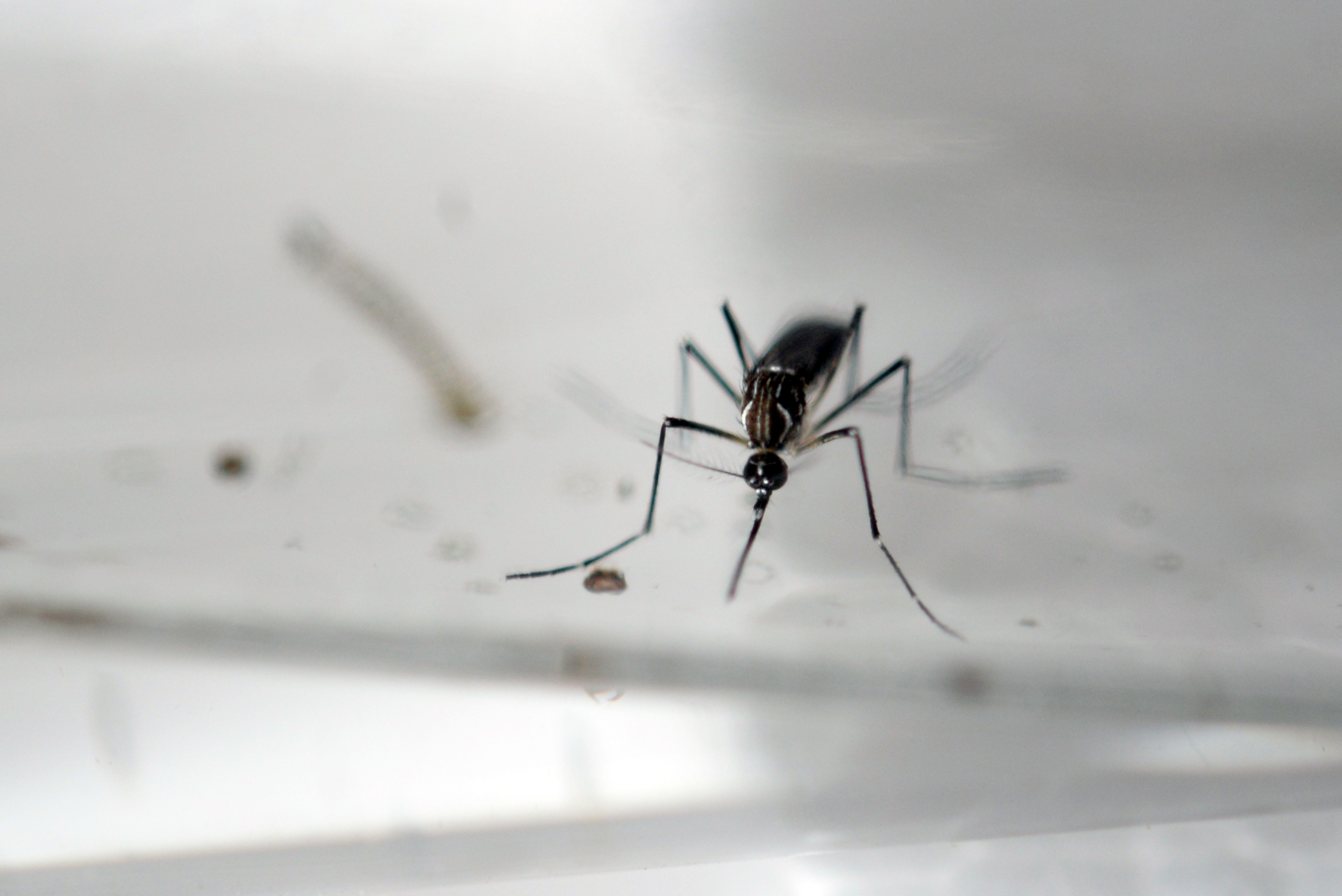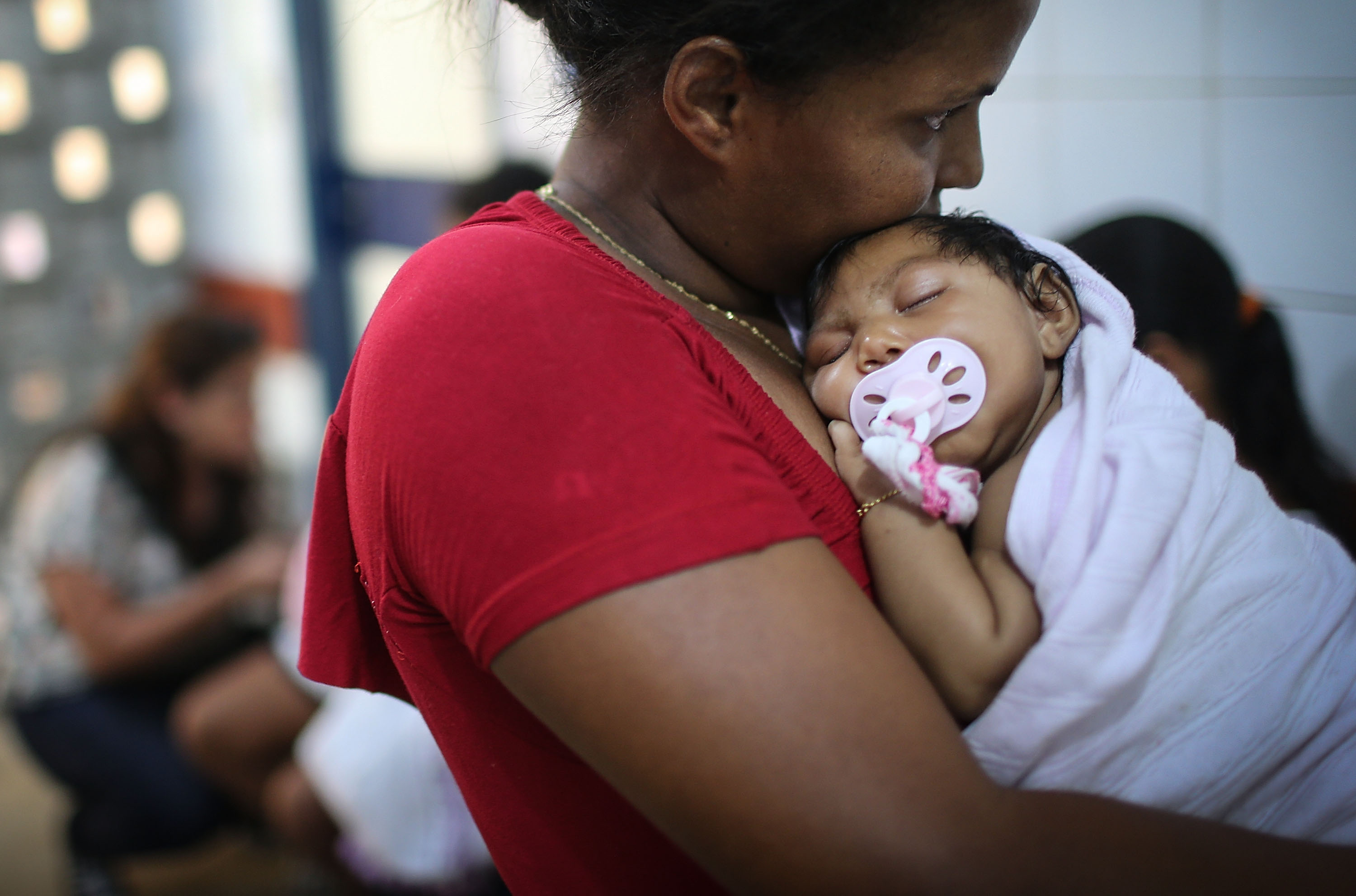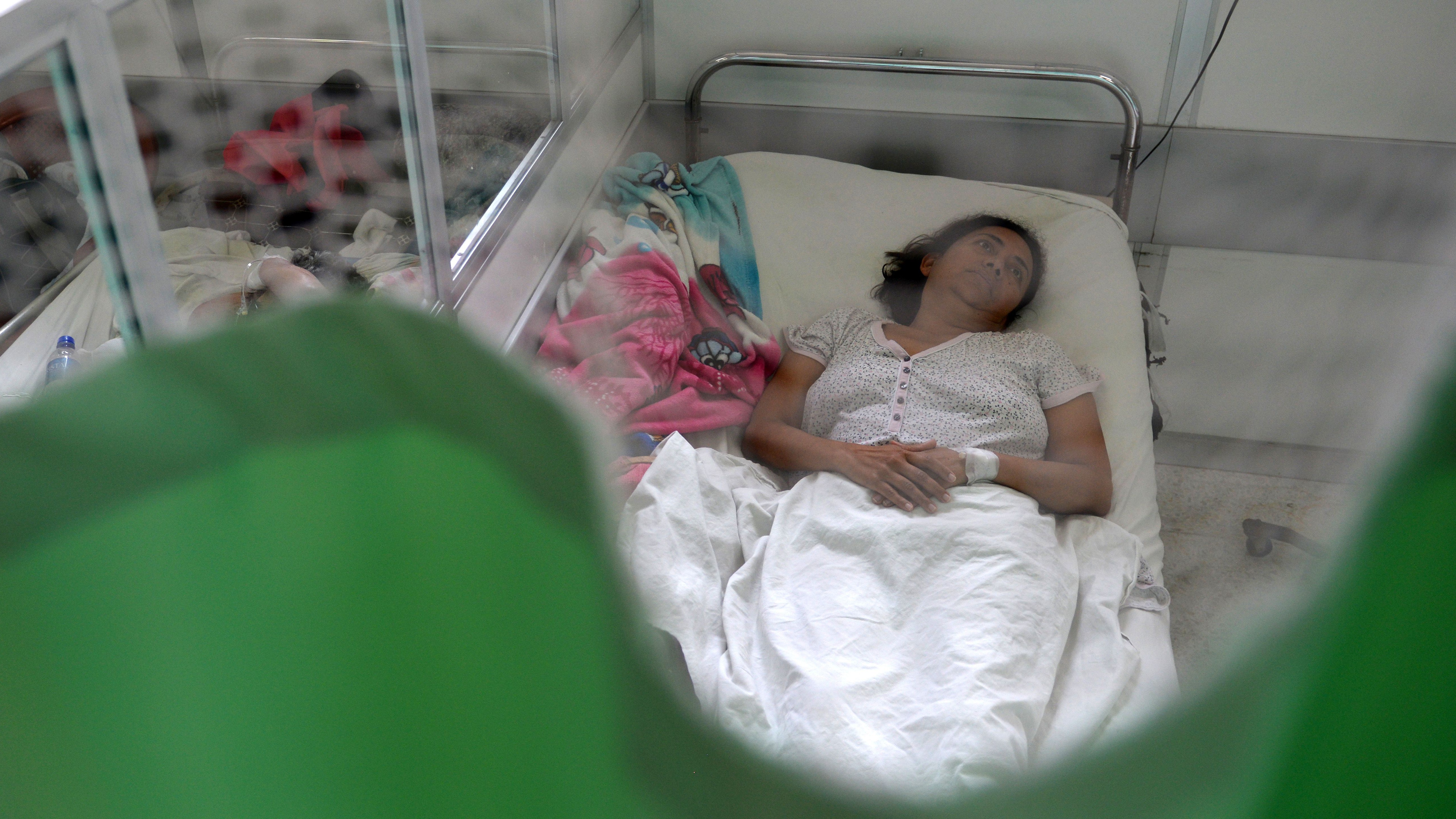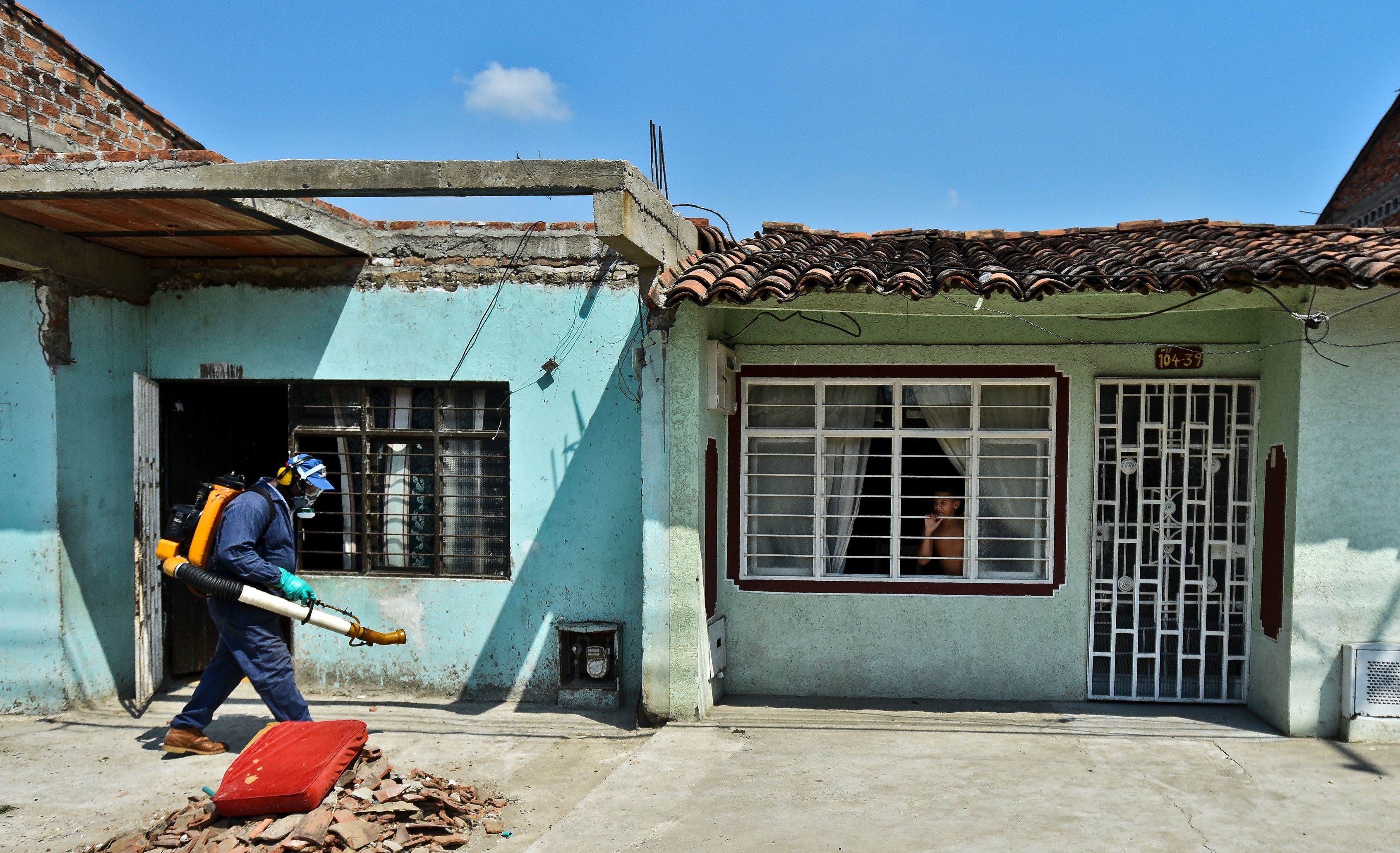
A municipal agent sprays anti Zika mosquitos chemical product at the sambadrome in Rio de Janeiro, on January 26, 2016. (Getty)
The Zika virus, a mosquito-borne infection that has affected millions of people in the Americas since last May, has “usually mild” symptoms, and is rarely deadly, according to the Centers for Disease Control.
But health officials have become more concerned about the Zika virus because of the potential link to birth defects in children born to mothers infected with the virus. More than 4,000 cases of microcephaly have been reported in Brazil, the country that has been hit the hardest by Zika virus. While the Centers for Disease Control says the connection between the virus and birth defects is still being determined, it has advised pregnant women to consider postponing trips to the countries where Zika virus has been detected.
The Zika virus was first detected in the Americas in May 2015 in Brazil, according to the CDC. There have been cases of Zika virus infection in the United States, but all have been from travelers returning to the country. None have been transmitted in the U.S.
The World Health Organization says it is holding a committee meeting to decide whether the infection constitutes a public health emergency, with health experts saying the virus could continue to spread throughout the Americas in the next year.
Here’s what you need to know about the Zika virus and its symptoms:
1. Symptoms Include Fever, Rash, Joint Pain & Red Eyes

An Aedes Aegypti mosquito is photographed in a laboratory of control of epidemiological vectors in San Salvador, on January 27, 2016. (Getty)
About 1 in 5 people infected with the Zika virus become ill, the Centers for Disease Control says. The virus remains in the infected person’s blood for a few days, and the “usually mild” symptoms last for several days to a week, according to the CDC.
According to the CDC the symptoms include:
Severe illness requiring hospitalization is rare and the infection is typically not fatal.
2. The Zika Virus Has Been Linked to Microcephaly & Other Birth Defects

Grandmother Ivalda Caetano holds 2-month-old Ludmilla Hadassa Dias de Vasconcelos, who has microcephaly, at Oswald Cruz hospital on January 26, 2016 in Recife, Brazil. In the last four months, authorities have recorded close to 4,000 cases in Brazil in which the mosquito-borne Zika virus may have led to microcephaly in infants. The ailment results in an abnormally small head in newborns and is associated with various disorders including decreased brain development. (Getty)
The CDC says that the birth defect microcephaly, a potentially crippling condition where a baby is born with a smaller head than expected when compared to babies of the same age and sex, has been connected to Zika virus. “Knowledge of the link between Zika and these outcomes is evolving,” the CDC says. Microcephaly could cause a child to simply have a smaller head, or could stunt brain size and development.
Dr. Frank Esper, an infections disease specialist, told ABC News ,”We know the developmental milestones for each of these children. The researchers will be able to look at their children and see if they are meeting their developmental milestones. I expect that in 2016, we will have a better idea about what it means for the child” to have Zika-related microcephaly.
There is no cure or treatment for microcephaly. Infants can get treatment for other health issues that result because of the defect, including seizures.
“If the association between microcephaly and Zika virus is confirmed, there will be an ethical imperative to protect women of childbearing age from contracting the infection,” Dr. Lawrence Gostin, of the O’Neill Institute for National and Global Health Law at Georgetown University, said in a statement. “The public will demand well-funded, proactive leadership from the World Health Organization.”
3. Some Infected With the Virus Have Developed the Neurological Syndrome Guillain-Barré

A patient suffering from the Guillain-Barre neurological syndrome recovers in the neurology ward of the Rosales National Hospital in San Salvador. (Getty)
The virus has also been linked to the neurological syndrome Guillain-Barré, which can cause paralysis, the Centers for Disease Control says:
Guillain-Barre syndrome (GBS) is a rare disorder where a person’s own immune system damages the nerve cells, causing muscle weakness and sometimes, paralysis. These symptoms can last a few weeks or several months. While most people fully recover from GBS, some people have permanent damage and in rare cases, people have died.
The Brazil Ministry of Health is currently reporting an increase in GBS cases that have occurred at the same time as their outbreak of Zika virus, and similar increases in GBS have been reported following past outbreaks of Zika in other countries. CDC will be conducting a study in Brazil beginning in late January to determine if any relationship exists between Zika virus infection and Guillain-Barre Syndrome.
“A causal relationship between Zika virus infection and birth defects and neurological syndromes has not been established, but is strongly suspected,” the World Health Organization says.
4. There Are No Vaccines to Prevent or Treat Zika Virus Infections

A Health Secretary employee fumigates against mosquito Aedes Aegypti mosquito outside houses of Cali, Colombia. (Getty)
There is no vaccine to prevent or treat Zika virus infections, the CDC says. The best way to avoid infection is to prevent mosquito bites, the health organization says.
The CDC says to treat the symptoms of Zika virus infection:
– Get plenty of rest
– Drink fluids to prevent dehydration
– Take medicines, such as acetaminophen or paracetamol, to relieve fever and pain
– Do not take aspirin and other non-steroidal anti-inflammatory drugs (NSAIDs), like ibuprofen and naproxen. Aspirin and NSAIDs should be avoided until dengue can be ruled out to reduce the risk of hemorrhage (bleeding). If you are taking medicine for another medical condition, talk to your healthcare provider before taking additional medication.
“If you have Zika, avoid mosquito bites for the first week of your illness. During the first week of infection, Zika virus can be found in the blood and passed from an infected person to another mosquito through mosquito bites,” the CDC says. “An infected mosquito can then spread the virus to other people.”
5. The Disease Is Expected to Continue to Spread Throughout the Americas in 2016

Aedes aegypti mosquitos are seen in containers at a lab of the Institute of Biomedical Sciences of the Sao Paulo University, on January 8, 2016 in Sao Paulo, Brazil. (Getty)
The World Health Organization predicts the virus will infect 3 million to 4 million people in the Americas in the next year as it continues to spread.
‘The possible links, only recently suspected, have rapidly changed the risk profile of Zika, from a mild threat to one of alarming proportions,” WHO’s Director General Dr. Margaret Chan said. “Moreover, conditions associated with this year’s El Nino weather pattern are expected to increase mosquito populations greatly in many areas. Questions abound. We need to get some answers quickly.”
